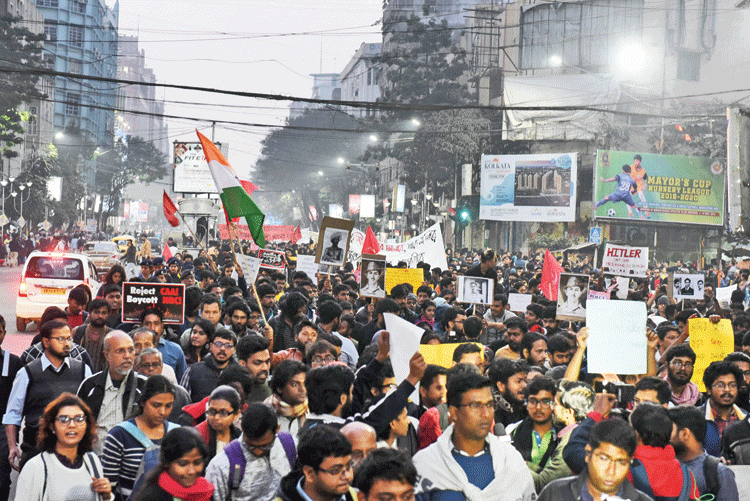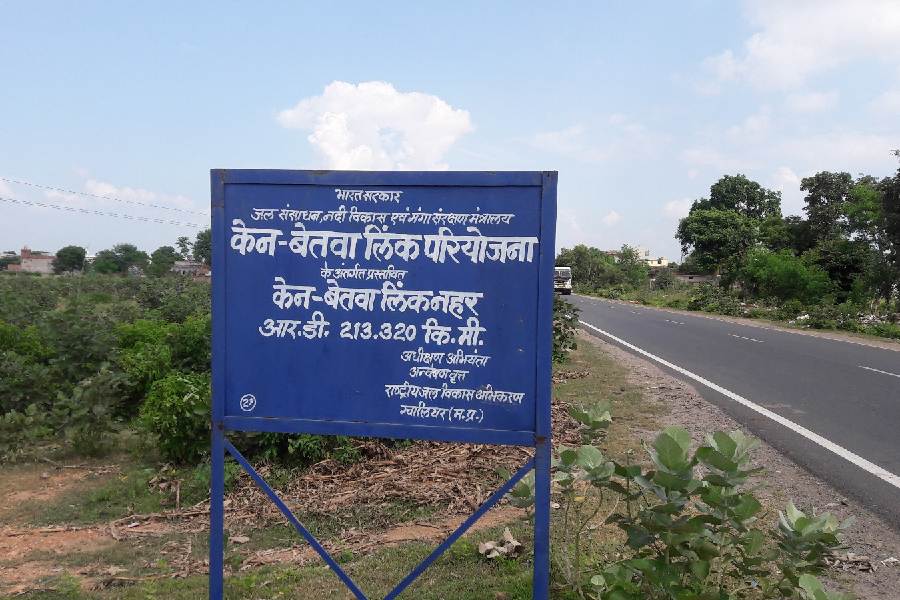A few hours’ call by a group of students culminated in the march of over 20,000 feet across the heart of Calcutta.
In the chants of “we will not show our papers” that rent the evening air, along with students walked thousands from various backgrounds but united in their opposition to the amended citizenship act.
One end of a giant banner was held by Amira Fazal, a third-year student of international relations at Jadavpur University. Senjuti Karmakar, doing her master’s in economics from JNU, held the other end. The two, who had never met before, walked side by side for two hours, shouting slogans together.
“As a citizen, I feel betrayed by the passage of this bill,” said Amira, who aspires to become a civil servant.
The rally started from Shahid Minar around 4.30pm and reached Mahajati Sadan, over 3km away, around 6.30pm. But the marchers stayed there for another hour, singing and shouting slogans.
When the head of the rally was at Yogayog Bhavan, the postal department’s Calcutta headquarters on Central Avenue, the tail was at Victoria House, the CESC headquarters over 1.5km apart.
Armed with cymbals and dhols, the protesters sang songs of equality and raised slogans of revolution, rekindling the memories of another rally five years ago. The Hok Kolorob march in 2014 had come four days after a police crackdown on Jadavpur University and the protesters had enough time to organise the blockbuster rally.
In comparison, the Facebook posts and WhatsApp alerts on Saturday’s march started getting noticed since Friday. “Some of our posters became viral but we had not expected so many people,” said a student of Jadavpur University, among the organisers of the rally. Police put the number above 10,000.
While the city has seen a series of big anti-NRC rallies over the past few days, Saturday’s march stood out for its spunk and spontaneity. “Wanted dhokla (Gujarati snack), got dhoka (deceit),” read one poster. “My documents have been stolen by the same thief who stole the Rafale papers,” read another.
Before the rally started, standing a few metres from a boisterous group of protesters was a turbaned youth with a poster that read “hum ek hain (we are one)”. Avneesh Narang, son of a Bengali mother and Sikh father, did his schooling in the city before moving to Delhi where he studied economics at St Stephen’s College. “All my life, I had pretty much been in my own cosy bubble. I was never used to protesting. But things have changed. If you are quite now, you are complicit,” said the soft-spoken youth, who works with a private consultancy.
A battery of cameras was facing a middle-aged man in the rally, clad in a Santa cap, a saffron kurta and a lungi. “My name Joseph Narendra Mohammad,” the man said, pointing to the three elements of his attire.
Prime Minister Narendra Modi had last Sunday told an election rally in Jharkhand that those indulging in violence over the Citizenship (Amendment) Act could be identified by their clothes.
“Fascism is knocking at our doors. Otherwise, why would a Prime Minister discriminate citizens on the basis of their clothes,” asked the man, a painter whose real name is Abhijit Mitra. The 60-year-old Garia resident has been a regular at all anti-CAA rallies in the city.
Traffic in central Calcutta was brought to a standstill by the rally. But several people waiting in buses and cabs seemed struck by the zeal of the marchers. Ditto for passers-by and employees and residents of the offices and houses along Central Avenue who flocked the balconies to take pictures of the rally.
A sizeable police contingent led by senior officers accompanied the marchers. The organisers also made frequent appeals to maintain peace and warning the marchers against “BJP goons trying to instigate them”. But tempers briefly flared when the rally neared Muralidhar Sen Lane, a narrow alley off Central Avenue that houses the state BJP headquarters.
A few chants of “Jai Shri Ram” coming from other side of the road were no match for the marchers, whose decibel levels shot past the sky while passing the stretch. A series of double-decker buses with their carriers packed with luggage stood right in front of the entrance to Muralidhar Sen Lane, blocking further view.
Some protesters tried to scale the barricades to jump over to the other flank of the road that leads to the BJP headquarters but were thwarted by the cops.











